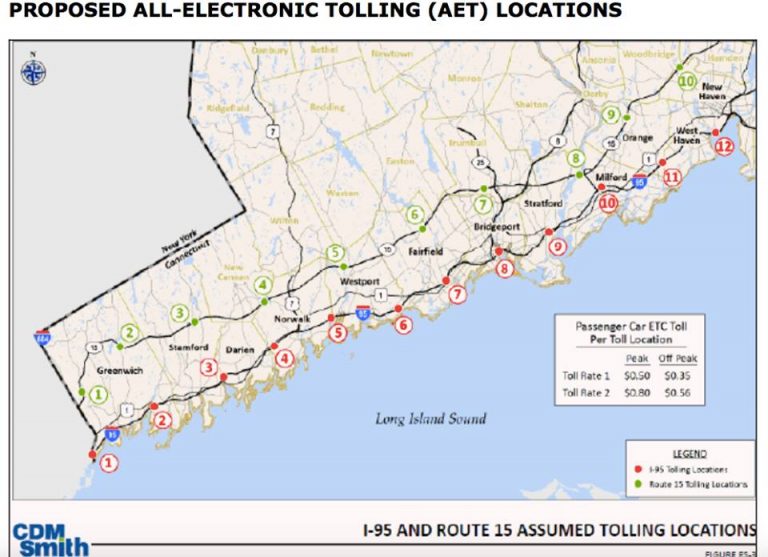#HARTFORD, CT – Governor Dannel P. Malloy today released the outline of his administration’s revenue package to stabilize the Special Transportation Fund (STF) and allow for critical investments in the state’s transportation system to take place. Implementation of the administration’s plan for the STF would restore canceled state and municipal projects across Connecticu and would prevent drastic increases in rail and bus fares and major service reductions on Metro-North, Shore Line East, and CTtransit bus services.
Without the reinstatement of canceled projects, Connecticut’s infrastructure will fall further into a state of disrepair, making our roads and bridges less safe for residents and harming the state’s economy.
The proposal takes four specific actions in order to stabilize the STF and bring critical projects back online:
- A seven-cent increase in the gas tax, gradually implemented over a four-year period.
- Implementation of statewide electronic tolling beginning in fiscal year 2023.
- Acceleration of the transfer of car sales tax by two years.
- Establishment of a $3.00 per tire fee on tire purchases.
The STF finances the state’s entire transportation system, including the operating costs of the Connecticut Department of Transportation (CTDOT) and all of the services it provides. In December, Governor Malloyreiterated and increased his warnings on the solvency of the fund following the release of a report showing that without prompt action, it will be in deficit by fiscal year 2019, which begins July 1, 2018. Earlier this month, the Governor and the CTDOT indefinitely suspended $4.3 billion in projects affecting every town across the state, including critical improvements to the I-91/Route 15 interchange on the Charter Oak Bridge, the replacement of the Waterbury Mixmaster, and the widening of I-95 from Bridgeport to Stamford.
“Investment in transportation is investment in Connecticut’s economic future,” Governor Malloy said. “But for decades, our state has chronically underfunded our roads, bridges, tunnels, and rails, and as a result our infrastructure consistently ranks among the worst in the nation. Without new revenues this year, we face a transportation cliff. We will be forced to make draconian cutbacks, affecting even routine maintenance. If we want to revitalize our urban centers and attract the jobs of tomorrow, we absolutely must ensure the solvency of the Special Transportation Fund, and we must do it early in this legislative session. We can no longer afford to wait – it’s time for action.”
“The combination of immediate and long term additional revenue provided by the Governor’s recommendations represents a solution to maintaining our commitment to operate a safe highway, bus and rail transportation network and to avoid serious deterioration of our state and municipal transportation infrastructure,” CTDOT Commissioner James P. Redeker said. “The additional revenue in fiscal year 2019 will relieve bus and rail riders of the potential for massive impacts to fares and service. Overall, the implementation of a growing, predictable income stream to the fund will enable the effective planning and delivery of the quality transportation system that Connecticut’s economy depends on.”
In 1997, Connecticut’s gas tax was reduced from $0.39 per gallon to $0.25 per gallon and it has not been increased since. Over the same period, rail fares have increased by 54 percent and bus fares have increased by 75 percent. And while Connecticut has refused to increase transportation revenue, 26 states – including eight in the past year – have increased their gas taxes. This isn’t limited to “blue” states; it includes GOP-dominated states like South Carolina and Tennessee. In 2016, New Jersey’s former GOP Governor Chris Christie signed a $0.23 per gallon increase in the gas tax.
“Despite big promises of a massive infrastructure package, it has become clear that the Trump administration has no plans to make real investments in our transportation system,” Governor Malloy added. “Other states have realized that they must take matters into their own hands, and we must do the same to ensure the viability of the Special Transportation Fund.”

